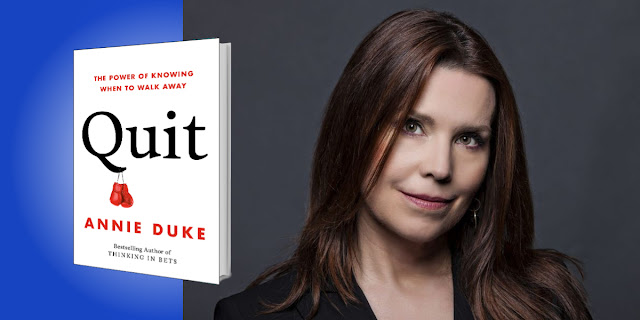Here are a few excerpts from a book I recently read, "Quit: The Power of Knowing When to Walk Away," by Annie Duke.
By definition, anybody who has succeeded at something
has stuck with it. That’s a statement of fact, always true in hindsight.
But that doesn’t mean that the inverse is true, that if you stick to
something, you will succeed at it. Prospectively, it’s neither true nor
good advice. In fact, sometimes it’s downright destructive.
If
you are able to cut your losses earlier, that’s a huge win. An added
bonus is that it frees you up so you can turn your limited attention and
resources to more fruitful endeavors that have a higher expected value,
reducing opportunity costs.
“If
we find the Achilles’ heel,” Teller told me, “thank God we found the
Achilles’ heel after $2 million instead of after $20 million.”
Astro Teller clearly understands that quitting gets you where you want to go faster.
The
sooner you figure out that you should walk away, the sooner you can
switch to something better. And the sooner that happens, the more
resources you’re saving, which you can then devote to more fruitful
endeavors.
When it comes to quitting, the most painful thing to quit is who you are.
Success
means following a good decision process, not just crossing a finish
line, especially if it is the wrong one to cross. That means
appropriately following kill criteria, listening to our quitting
coaches, and recognizing that the progress we’ve made along the way
counts for a lot. We also need to redefine what waste is. What does it
mean to waste your time or money or effort?
Our
problem is that we tend to think about these things in a
backward-looking way. We feel like if we walk away from something, that
means we’ve wasted everything that we put into it.
But those are resources that are already spent. You can’t get them back.
We
need to start thinking about waste as a forward-looking problem, not a
backward-looking one. That means realizing that spending another minute
or another dollar or another bit of effort on something that is no
longer worthwhile is the real waste.
Contrary to popular belief, winners quit a lot. That’s how they win.



No comments:
Post a Comment